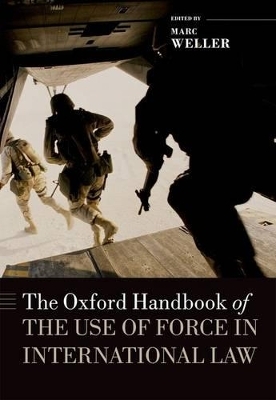
The Oxford Handbook of the Use of Force in International Law
Oxford University Press (Verlag)
978-0-19-967304-9 (ISBN)
The prohibition of the use of force in international law is one of the major achievements of international law in the past century. The attempt to outlaw war as a means of national policy and to establish a system of collective security after both World Wars resulted in the creation of the United Nations Charter, which remains a principal point of reference for the law on the use of force to this day. There have, however, been considerable challenges to the law on the prohibition of the use of force over the past two decades.
This Oxford Handbook is a comprehensive and authoritative study of the modern law on the use of force. Over seventy experts in the field offer a detailed analysis, and to an extent a restatement, of the law in this area. The Handbook reviews the status of the law on the use of force, and assesses what changes, if any, have occurred in consequence to recent developments. It offers cutting-edge and up-to-date scholarship on all major aspects of the prohibition of the use of force. The work is set in context by an extensive introductory section, reviewing the history of the subject, recent challenges, and addressing major conceptual approaches. Its second part addresses collective security, in particular the law and practice of the United Nations organs, and of regional organizations and arrangements. It then considers the substance of the prohibition of the use of force, and of the right to self-defence and associated doctrines. The next section is devoted to armed action undertaken on behalf of peoples and populations. This includes self-determination conflicts, resistance to armed occupation, and forcible humanitarian and pro-democratic action. The possibility of the revival of classical, expansive justifications for the use of force is then addressed. This is matched by a final section considering new security challenges and the emerging law in relation to them. Finally, the key arguments developed in the book are tied together in a substantive conclusion. The Handbook will be essential reading for scholars and students of international law and the use of force, and legal advisers to both government and NGOs.
Marc Weller is Director of the Lauterpacht Centre for International Law, University of Cambridge. He became a member of the Faculty of Law of the University of Cambridge in 1990. From 1997-2000 he was Deputy Director of the Centre of International Studies. He has been Director of Graduate Education in the Department of Politics and International Studies of the University since 2008. Professor Weller holds Masters degrees from the Fletcher School of Law and Diplomacy and the University of Cambridge, and Doctorates in Law, in Economic and Social Sciences, and in International Law from the Universities of Frankfurt, Hamburg and Cambridge respectively. Jake William Rylatt is Research Assistant to the Legal Tools for Peace-Making Project, Lauterpacht Centre for International Law, University of Cambridge Alexia Solomou is Associate Legal Officer, International Court of Justice.
I INTRODUCTION; II COLLECTIVE SECURITY AND THE NON-USE OF FORCE; III THE PROHIBITION OF THE USE OF FORCE, SELF-DEFENCE, AND OTHER CONCEPTS; IV ACTION ON BEHALF OF PEOPLES AND POPULATIONS; V REVIVAL OF CLASSICAL CONCEPTS?; VI EMERGING AREAS?; VII GENERAL PROBLEMS
| Erscheint lt. Verlag | 15.1.2015 |
|---|---|
| Reihe/Serie | Oxford Handbooks |
| Mitarbeit |
Stellvertretende Herausgeber: Jake William Rylatt, Alexia Solomou |
| Verlagsort | Oxford |
| Sprache | englisch |
| Maße | 171 x 246 mm |
| Gewicht | 1926 g |
| Themenwelt | Recht / Steuern ► EU / Internationales Recht |
| Recht / Steuern ► Öffentliches Recht ► Völkerrecht | |
| Sozialwissenschaften ► Politik / Verwaltung ► Europäische / Internationale Politik | |
| ISBN-10 | 0-19-967304-7 / 0199673047 |
| ISBN-13 | 978-0-19-967304-9 / 9780199673049 |
| Zustand | Neuware |
| Informationen gemäß Produktsicherheitsverordnung (GPSR) | |
| Haben Sie eine Frage zum Produkt? |
aus dem Bereich


